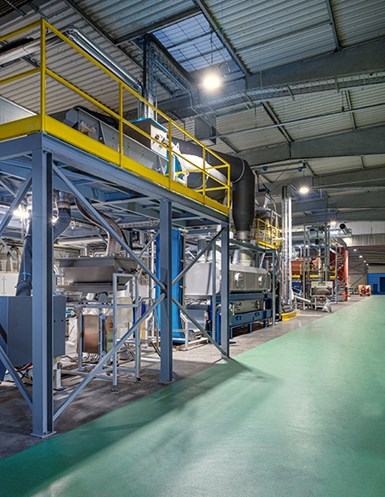Apply Carbon establishes mass recycled carbon fiber production facility
Apply Carbon has completed the commission of a fully automated production plant for recycled carbon fibers, with an estimated capacity of 4,000 metric tons.

Apply Carbon (Languidic, France) has recently established a 16,500-square-meter factory dedicated to carbon fiber recycling — alongside an acquisition of an additional 100,000 square meters of land for future expansion — to met growing demand across end markets. The factory produces close to 2,000 metric tons of recycled carbon fiber per year, with a nameplate capacity nearing 4,000 metric tons per year. It holds a stock of approximately 3,000 metric tons of raw materials, to promote high product quality, uniformity and security of supply.
Adjacent to the facility for recycled carbon fibers, Apply Carbon has also set up a dedicated production area for recycled para-aramid fibers, with an annual production capacity exceeding 700 metric tons. The additional capacity for milled and granulated aramid products aims to help meet rapidly increasing demand, whether for abrasion-resistant polymer compounds used in friction and wear applications or for aramid pulp used in low-wear and dust-free brake pads — areas that Apply Carbon has been serving for several years.
The company’s investment has also been geared toward establishing standards in terms of manufacturing and energy efficiency.
“Virtually all production processes — from the milling of raw materials to the granulation, sizing, cutting and packaging of finished products — have been automated to ensure cost-effectiveness and batch-to-batch reproducibility” says Hervé Cayuela, CEO of Apply Carbon.
Heat pumps are used to power the advanced drying ovens; a SCADA system has been implemented to minimize energy use across the entire facility; and the installation of 1-megawatts of solar power capacity will promote that more than half of the factory’s energy demand is covered by renewable energy.
The grand opening of Apply Carbon’s carbon fiber recycling facility in Plouay, France, is planned for January 2024.
Related Content
-
Bio-based acrylonitrile for carbon fiber manufacture
The quest for a sustainable source of acrylonitrile for carbon fiber manufacture has made the leap from the lab to the market.
-
Welding is not bonding
Discussion of the issues in our understanding of thermoplastic composite welded structures and certification of the latest materials and welding technologies for future airframes.
-
TU Munich develops cuboidal conformable tanks using carbon fiber composites for increased hydrogen storage
Flat tank enabling standard platform for BEV and FCEV uses thermoplastic and thermoset composites, overwrapped skeleton design in pursuit of 25% more H2 storage.














